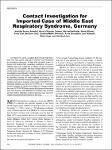Contact Investigation for Imported Case of Middle East Respiratory Syndrome, Germany
Reuss, Annicka
Litterst, Annette
Drosten, Christian
Seilmaier, Michael
Böhmer, Merle
Graf, Petra
Gold, Hermann
Wendtner, Clemens-Martin
Zanuzdana, Arina
Schaade, Lars
Haas, Walter
Buchholz, Udo
On March 19, 2013, a patient from United Arab Emirates who had severe respiratory infection was transferred to a hospital in Germany, 11 days after symptom onset. Infection with Middle East respiratory syndrome coronavirus (MERS-CoV) was suspected on March 21 and confirmed on March 23; the patient, who had contact with an ill camel shortly before symptom onset, died on March 26. A contact investigation was initiated to identify possible person-to-person transmission and assess infection control measures. Of 83 identified contacts, 81 were available for follow-up. Ten contacts experienced mild symptoms, but test results for respiratory and serum samples were negative for MERS-CoV. Serologic testing was done for 53 (75%) of 71 nonsymptomatic contacts; all results were negative. Among contacts, the use of FFP2/FFP3 face masks during aerosol exposure was more frequent after MERS-CoV infection was suspected than before. Infection control measures may have prevented nosocomial transmission of the virus.
No license information

